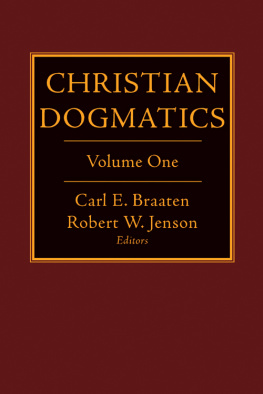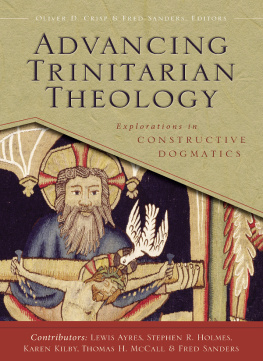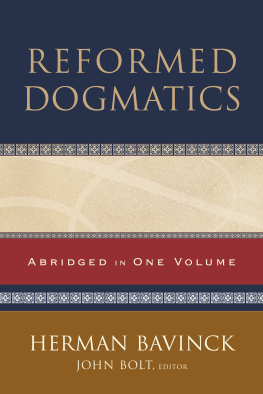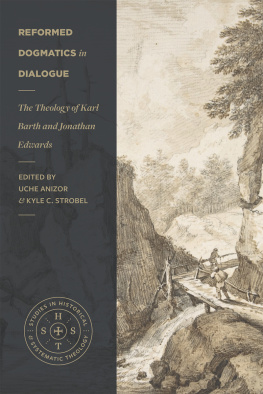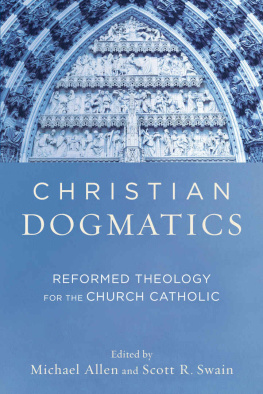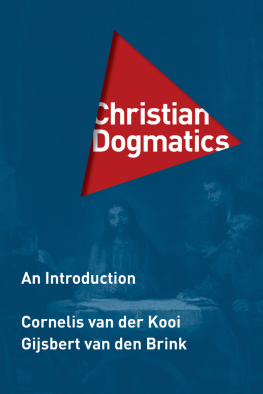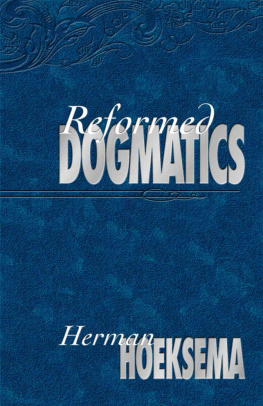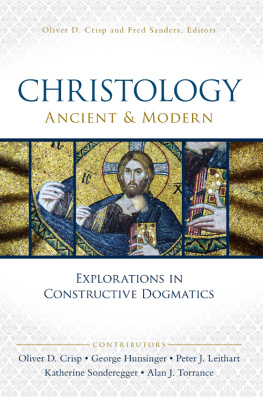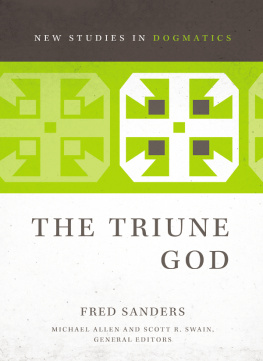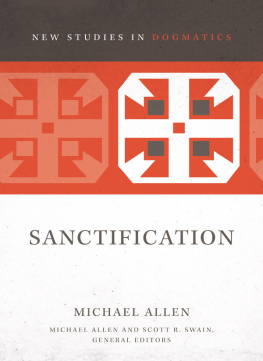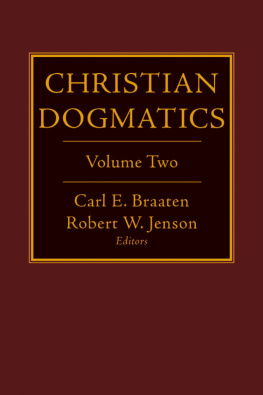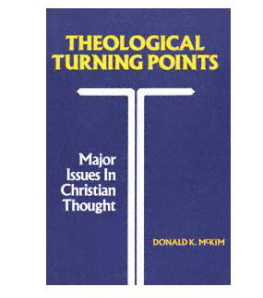
Christian Dogmatics
Contributors
Carl E. Braaten is Professor of Systematic Theology at the Lutheran School of Theology at Chicago, Illinois.
Gerhard O. Forde is Professor of Systematic Theology at Luther Northwestern Theological Seminary in St. Paul, Minnesota.
Philip J. Hefner is Professor of Systematic Theology at the Lutheran School of Theology at Chicago.
Robert W. Jenson is Professor of Religion at St. Olaf College, Northfield, Minnesota.
Hans Schwarz is Professor of Protestant Theology at the University of Regensburg, Federal Republic of Germany.
Paul R. Sponheim is Professor of Systematic Theology at Luther Northwestern Theological Seminary in St. Paul, Minnesota.
VOLUME 1
Christian Dogmatics
Carl E. Braaten, editor
Gerhard O. Forde
Philip J. Hefner
Robert W. Jenson, editor
Hans Schwarz
Paul R. Sponheim
FORTRESS PRESS
PHILADELPHIA
CHRISTIAN DOGMATICS
Volume 1
First Fortress Press paperback edition 2011
Copyright 1984 Fortress Press. All rights reserved. Except for brief quotations in critical articles or reviews, no part of this book may be reproduced in any manner without prior written permission from the publisher. Visit http://www.augsburgfortress.org/copyrights/ or write to Permissions, Augsburg Fortress, Box 1209, Minneapolis, MN 55440.
Scripture quotations, unless otherwise noted, are from the Revised Standard Version Bible, copyright 1946, 1952, 1971, 1973 by the Division of Christian Education of the National Council of the Churches of Christ in the USA and are used by permission. All rights reserved.
Technical editors: John M. Stroup and Margaret B. Hoover
Chapter 4 of Locus 1 is based in part on Principles of Lutheran Theology by Carl E. Braaten (Philadelphia: Fortress Press, 1983).
Locus 2 is based in part on The Triune Identity by Robert W. Jenson (Philadelphia: Fortress Press, 1982).
Locus 3 is based in part on an article in Word and World 1:3 (Summer 1981), Word and World: The Experience of God, Self, and World, pp. 25261.
Chapter 7 of Locus 6, The Uniqueness and Universality of Jesus Christ, was originally a paper read at the 1979 meeting of the American Society of Missiology and was published by the Occasional Bulletin of Missionary Research and by Missiology, January 1980, and by Mission Trends 5, ed. By Gerald H. Anderson and Thomas F. Stransky (New York/Ramsey: Paulist; Grand Rapids, Mich.: Eerdmans, 1981), pp. 6989.
eISBN 9781451404784
ISBN 978-0-8006-9868-3
The Library of Congress cataloged the hardcover edition as follows:
Library of Congress Cataloging-in-Publication Data
Christian dogmatics.
Includes index.
1. Theology, Doctrinal. 2. Lutheran Church
Doctrines. I. Braaten, Carl E., 1929
II. Jenson, Robert W.
BT75.2.C48 1984 230.41 83-48007
ISBN 13: 978-0-8006-0703-6
Contents
VOLUME 1
by Carl E. Braaten
by Robert W. Jenson
by Paul R. Sponheim
by Philip J. Hefner
by Paul R. Sponheim
by Carl E. Braaten
The conception of this book took place in the late 1970s as the editors again remarked on the fact that almost all our usable dogmatics have been imported from Europe. In the decades since World War II we have used all or parts of the imposing volumes of the continental theologiansEmil Brunner, Karl Barth, Gustaf Auln, Regin Prenter, and Paul Tillich. As teachers of dogmatic and systematic theology, we have had no textbooks that reflect the American context from the standpoint of the Lutheran tradition. We set out to rectify the situation by means of a team of authors.
Our intention in producing a complete dogmatics, with emphasis on information about the dogmatic tradition, is to serve two purposes above all: We hope our work will be a textbook in theological instruction and a resource for those who practice the arts of ministry. It lies in the nature of a work such as this to seek the widest possible churchly acceptance, since dogmatics speaks from the church to the church, by way of disciplined reflection on the sources of its faith and traditions. But theology at present is fragmented into an unusually large number of schools and movements. The fact of theological pluralism is inescapable. We have chosen to make a virtue out of a necessity by way of multiple authorship. A dogmatics by any one person would likely be received only as advocacy for the positions of that persons own school of thought, and thus fail to command the wide churchly use inherent in the notion of dogmatics. Hoping to avoid this fate, we offer this joint work of six authors.
Although all of us stand within the Lutheran tradition, the differences among us, and the consequent inconsistencies in the book, are considerable. Those who like to label theologianshope, process, etc.will by our calculations need seven or more labels for the six of us. The authors have different concentrations of historical knowledge; some refer most naturally to the fathers, others to the reformers, and still others to modern theologians. At some points the authors simply disagree, and this disagreement occasionally reaches the point of contradiction. We will leave it to the readers to discover the places where this occurs. Whether these differences and disagreements be taken as bane or blessing, they follow from the initial reason for multiple authorship.
Yet we do not think we are presenting a mere collection of essays. A draft of each locus has been read and criticized by the whole group. Perhaps more important, the likenesses among us as authors are as great as the differences. All of us understand ourselves by intention and calling to be churchly theologians; the goal of our work is primarily the liveliness and authenticity of the gospel, and only secondarily increased understanding of religion or metaphysical construction. All of us have written theological works of other kindsexegetical, historical, apologetic, liturgical, homiletical, and so onbut here we are doing dogmatics in the classical tradition. All of us are of the same theological generation, and therefore influenced by the important theologians of the mid-twentieth century: Barth, Bultmann, Tillich, et al. We find it possible to disagree without either anathemas or relativism; the divergences between us are probably not greater than have always been usual in the theologically contentious Lutheran tradition from which we come. And we are indeed all Lutherans; this perhaps demands further comment.
It was an early decision to invite only Lutherans to write. At least so much commonality of tradition seemed essential if the book were not to be a mere collection and yet not be unified by common adherence to a current school of theology. At the same time, it is in the definition of Christian dogmatics that it aims at ecumenical validity and usefulness. None of us thinks of himself, either here or in his other works, as writing especially for Lutheran readers. The character of our Lutheranism will doubtless be detected in the book in many ways, such as a tendency to cite Luther himself when matters become earnest. But we believe that the true aim of the Lutheran movement has always been to serve the whole church, so that Lutheran commitment inherently bears an ecumenical orientation when it is true to its original nature.
Next page
